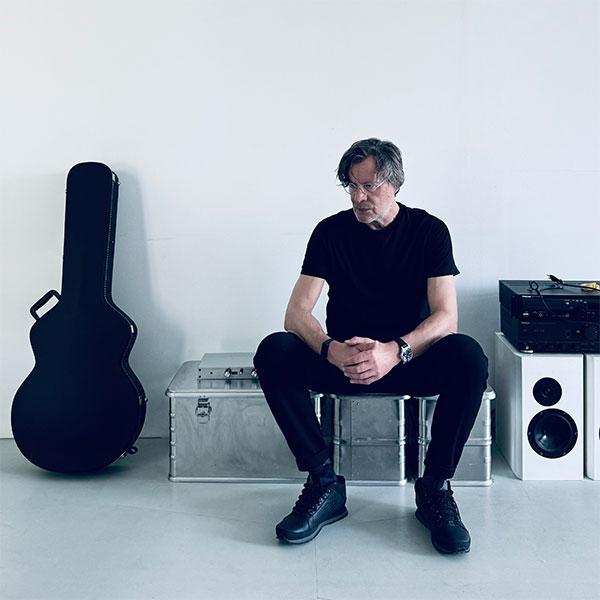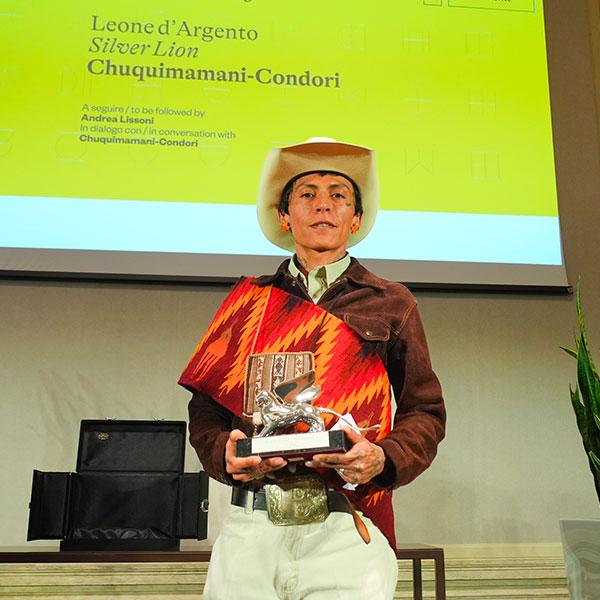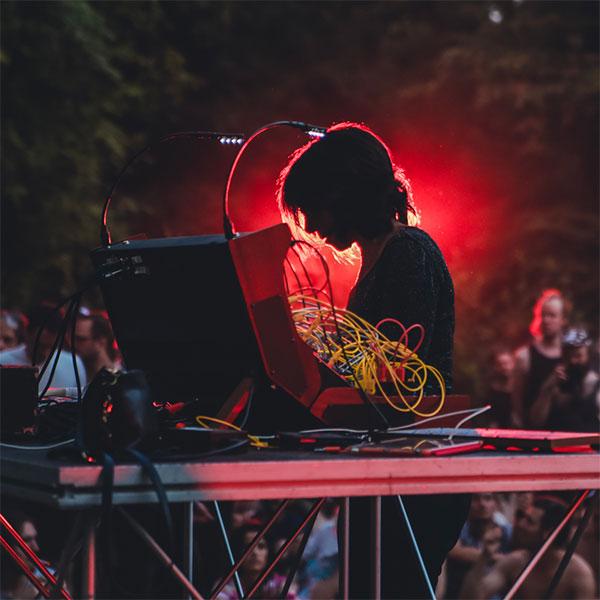
The 2024 Lion awards for music
The Golden Lion for Lifetime Achievement goes to composer Rebecca Saunders (27 September); the Silver Lion goes to the Ensemble Modern from Germany (29 September).
The awards
The Berlin-based English composer Rebecca Saunders, the creator of sonic worlds that enhance the listening experience, and one of the most widely acknowledged composers of our time, is the Golden Lion for Lifetime Achievement of Biennale Musica 2024. The Silver Lion has been awarded to Ensemble Modern, the historic German ensemble that for forty years has tread the paths of the European and American avantgarde, beside figures such as Stockhausen, Reich, Lachenmann, Andriessen, as well as Frank Zappa, Ornette Coleman, and Anthony Braxton.
The decision was made by the Board of Directors of La Biennale di Venezia upon recommendation by Lucia Ronchetti, director of the Music Department.
The awards ceremony for the Golden Lion and the Silver Lion will be held respectively on September 27th and 29th in Sala delle Colonne at Ca’ Giustinian, the headquarters of La Biennale, during the 68th International Festival of Contemporary Music (26 September > 11 October).
Rebecca Saunders
First woman to receive the Ernst-von-Siemens award in 2019, and subject of a dedicated focus at Lucerne Festival and Musikfest Berlin, Rebecca Saunders has been awarded the Golden Lion for Lifetime Achievement “for the refined sophistication of her research and her compositional intentions, for the attention she dedicates to the sonic microcosm, for her capacity to create a private listening area within the listener, an intimate inner acoustic space that evolves and amplifies the sonic imaginary. The composer conceives a specific temporality for each work which becomes an investigation into and experimentation with the experience of listening. Her elaboration of the sonic material is profoundly speculative and at the same time powerfully empirical and material, tied to the performance and the playing strategies” (from the motivation).
Rebecca Saunders has explained her research as follows: “Surface, weight and feel are part of the reality of musical performance: the weight of the bow on the string; the differentiation of touch of the finger on the piano key; the expansion of the muscles between the shoulder blades drawing sound out of the accordion; the in-breath preceding the 'heard' tone. Being aware of the grit and noise of an instrument, or a voice, reminds us of the presence of a fallible physical body behind the sound. This physical presence of the musician and his acoustic instrument, and of sound itself, are important sources of inspiration”.
Ensemble Modern
Ensemble Modern is awarded the Silver Lion “for the fearless and courageous creation of musical projects in collaboration with the most interesting and acknowledged composers and performers in the fields of media and different musical languages. In its 44 years of activity, the Ensemble has distinguished itself for its curiosity, energy, innovation, virtuosity and the passion with which it has dedicated itself to every new project. Unlike other historic ensembles dedicated to new music, the Ensemble Modern has a democratic organizational structure that allows all the members of the ensemble to discuss and together choose the new productions and performance engagements, which makes their interpretations passionate and precise. Their attitude towards composers from around the world is professional and respectful, both in the case of emerging young composers, and of great established composers. The members of the ensemble are soloists with different and contrasting personalities, and each of them responds to the demands of the new music in a different way, creating a complex multiform dialogue that enriches the compositional experience and stimulates research and creativity” (from the motivation).
Performing at the Biennale Musica since 1985, this year Ensemble Modern will return to the Biennale for the Italian premieres of two important complex instrumental works by Rebecca Saunders: Wound, which will inaugurate the Festival on September 26th at the Teatro La Fenice and for which the famous German ensemble will be joined by the Orchestra del Teatro conducted by Tito Ceccherini, and Skull, commissioned by La Biennale in collaboration with the Festival Acht Brücken, the Ensemble Contrechamps of Geneva, the Oslo Sinfonietta and the Ensemble Modern itself, which will perform it on September 28th at the Teatro Piccolo Arsenale, conducted by Bas Wiegers.
The Lions of previous editions
In the past the Golden Lion for Lifetime Achievement in Music has been awarded to Goffredo Petrassi (1994), Luciano Berio (1995), Friedrich Cerha (2006), Giacomo Manzoni (2007), Helmut Lachenmann (2008), György Kurtág (2009), Wolfgang Rihm (2010), Peter Eötvös (2011), Pierre Boulez (2012), Sofia Gubaidulina (2013), Steve Reich (2014), Georges Aperghis (2015), Salvatore Sciarrino (2016), Tan Dun (2017), Keith Jarrett (2018), George Benjamin (2019), Luis de Pablo (2020), Kaija Saariaho (2021), Giorgio Battistelli (2022), and Brian Eno (2023).
The Silver Lion has been awarded in the past to Vittorio Montalti and Francesca Verunelli (2010), RepertorioZero (2011), Quartetto Prometeo (2012), Fondazione Spinola Banna per l’Arte (2013), Ryo Murakami (2016), Dai Fujikura (2017), Sebastian Rivas (2018), Matteo Franceschini (2019), Raphaël Cendo (2020), Neue Vocalsolisten (2021), Ars Ludi (2022); and Miller Puckette (2023).
Biographical notes
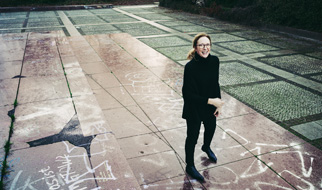 Rebecca Saunders (London, 1967) studied composition with Nigel Osborne in Edinburgh and Wolfgang Rihm in Karlsruhe. Saunders pursues an intense interest in the sculptural and spatial properties of organised sound, which she often creates in collaboration and dialogue with a wide variety of musicians and artists. Her works include: Chroma I - XX (2003-2017), Stasis, Stasis Kollektiv (2011/16), and Insideout, a 90-minute collage for a choreographed installation, created in collaboration with Sasha Waltz, her first work for the stage which received over 100 international performances. More recently in 2017, Yes, an expansive 80-minute spatial installation composition, was written for Musikfabrik, Donatienne Michel-Dansac and Enno Poppe for the architectural spaces of the Berlin Philharmonie and the St. Eustache Cathedral in Paris.
Rebecca Saunders (London, 1967) studied composition with Nigel Osborne in Edinburgh and Wolfgang Rihm in Karlsruhe. Saunders pursues an intense interest in the sculptural and spatial properties of organised sound, which she often creates in collaboration and dialogue with a wide variety of musicians and artists. Her works include: Chroma I - XX (2003-2017), Stasis, Stasis Kollektiv (2011/16), and Insideout, a 90-minute collage for a choreographed installation, created in collaboration with Sasha Waltz, her first work for the stage which received over 100 international performances. More recently in 2017, Yes, an expansive 80-minute spatial installation composition, was written for Musikfabrik, Donatienne Michel-Dansac and Enno Poppe for the architectural spaces of the Berlin Philharmonie and the St. Eustache Cathedral in Paris.
Since 2013, Saunders has written a series of solos and duos for performers with whom she has collaborated closely, including Bite for bass flute, Aether for bass clarinet duo, dust for percussion, O for soprano, hauch for violin, and Flesh for accordion. She has simultaneously pursued her keen interest in works in the concertante form, writing a double percussion concerto Void, a trumpet concerto Alba, and both Skin and Yes for soprano and large ensemble. In 2018 her double bass concerto Fury II was choreographed by Emanuel Gat in collaboration with Ensemble Modern as part of the Story Water project.
Saunders’ music has been performed and premiered by many prestigious ensembles, soloists and orchestras including, among others, Ensemble Musikfabrik, Klangforum Wien, Ensemble Modern, Quatuor Diotima, Asko|Schönberg, the Arditti Quartet, Ensemble Resonanz, Ensemble Recherche, ICE, the Neue Vocalsolisten, Ensemble Remix.
Her compositions have been recognised with numerous international prestigious awards, including the 2019 Ernst von Siemens Music Prize, the ARD und BMW musicaviva Prize, the Paul Hindemith Prize, four Royal Philharmonic Society Awards, four BASCA British Composer Awards, the GEMA Music Prize, the Hans und Gertrud Zender Preis and the Mauricio Kagel Music Preis.
Saunders is also active as a composition tutor and teaches regularly at the Darmstadt Summer Courses and at the Impuls Academy in Graz. She lives in Berlin and is a member of the Berlin Academy of Arts and the Sachsen Academy of Arts in Dresden.
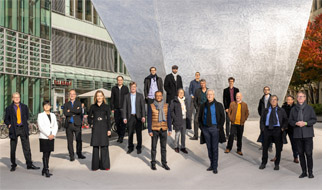 Ensemble Modern – One of the most well-known music formations in the world. This democratically organized ensemble, founded in 1980 and at home in Frankfurt am Main, is composed of 18 soloists. The musicians from Belgium, Bulgaria, Germany, Greece, India, Japan, Switzerland and the USA jointly decide on artistic projects, partnerships with other artists and all financial matters. Its aesthetic spectrum includes musical theatre works, dance and multimedia projects, chamber music, ensemble and orchestral concerts. Tours and guest appearances regularly take Ensemble Modern to renowned festivals throughout the world and major national and international performance venues.
Ensemble Modern – One of the most well-known music formations in the world. This democratically organized ensemble, founded in 1980 and at home in Frankfurt am Main, is composed of 18 soloists. The musicians from Belgium, Bulgaria, Germany, Greece, India, Japan, Switzerland and the USA jointly decide on artistic projects, partnerships with other artists and all financial matters. Its aesthetic spectrum includes musical theatre works, dance and multimedia projects, chamber music, ensemble and orchestral concerts. Tours and guest appearances regularly take Ensemble Modern to renowned festivals throughout the world and major national and international performance venues.
Ensemble Modern rehearses an average of 70 new works every year, 20 of which are world premieres, some of them commissioned by the ensemble itself. The works are mostly rehearsed in close contact with their composers. Ensemble Modern’s concept and goal is to achieve the highest possible precision in implementing a composer’s ideas. Its work is characterised by extraordinary and often long-term cooperative ventures with artists such as John Adams, Mark Andre, George Benjamin, Unsuk Chin, Peter Eötvös, Brian Ferneyhough, Heiner Goebbels, Hans Werner Henze, Heinz Holliger, Mauricio Kagel, György Kurtág, Helmut Lachenmann, György Ligeti, Cathy Milliken, Brigitta Muntendorf, Olga Neuwirth, Enno Poppe, Steve Reich, Wolfgang Rihm, Rebecca Saunders, Iris ter Schiphorst, Simon Steen-Andersen, Karlheinz Stockhausen, Mark-Anthony Turnage, Frank Zappa, Hans Zender and Vito Žuraj, as well as outstanding personalities from other artistic genres.
Ensemble Modern has run its own label, Ensemble Modern Media, since 2000. Further audio media, approximately 150 so far, have been released by other established labels. In 2003, the International Ensemble Modern Academy (IEMA) was founded to support Ensemble Modern’s education activities. Its goal is to convey the numerous artistic movements of our times as well as an open, creative manner of dealing with artistic processes.
